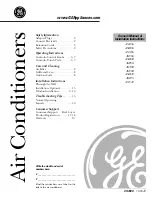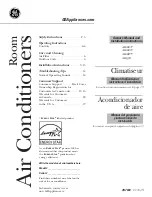
12
Table 1. Interpreting the Diagnostic LEDS
Status LED
Status LED Description
Status LED Troubleshooting Information
Green “POWER”
Module has power
Supply voltage is present at module terminals
Red “TRIP”
Thermostat demand signal
1. Compressor protector is open
Y is present, but the
2. Outdoor unit power disconnect is open
compressor is not
3. Compressor circuit breaker or fuse(s) is open
running
4. Broken wire or connector is not making contact
5. Low pressure switch open if present in system
6. Compressor contactor has failed open
Yellow “ALERT”
Long Run Time
1. Low refrigerant charge
Flash Code 1
Compressor is
2. Evaporator blower is not running
running extremely
3. Evaporator coil is frozen
long run cycles
4. Faulty metering device
5. Condenser coil is dirty
6. Liquid line restriction (filter drier blocked if present in system)
7. Thermostat is malfunctioning
8. Comfort Alert Failure
Yellow “ALERT”
System Pressure Trip
1. High head pressure
Flash Code 2
Discharge or suction
2. Condenser coil poor air circulation (dirty, blocked, damaged)
pressure out of limits or
3. Condenser fan is not running
compressor overloaded
4. Return air duct has substantial leakage
5. If low pressure switch present in system, check Flash
Code 1 information
Yellow “ALERT”
Short Cycling
1. Thermostat demand signal is intermittent
Flash Code 3
Compressor is running
2. Time delay relay or control board defective
only briefly
3. If high pressure switch present go to Flash Code 2 information
4. If low pressure switch present go to Flash Code 1 information
Yellow “ALERT”
Locked Rotor
1. Run capacitor has failed
Flash Code 4
2. Low line voltage (contact utility if voltage at disconnect is low)
• Check wiring connections
3. Excessive liquid refrigerant in compressor
4. Compressor bearings are seized
• Measure compressor oil level
Yellow “ALERT”
Open Circuit
1. Outdoor unit power disconnect is open
Flash Code 5
2. Compressor circuit breaker or fuse(s) is open
3. Compressor contactor has failed open
• Check compressor contactor wiring and connectors
• Check for compressor contactor failure (burned, pitted or
open)
• Check wiring and connectors between supply and
compressor
• Check for low pilot voltage at compressor contactor coil
4. High pressure switch is open and requires manual reset
5. Open circuit in compressor supply wiring or connections
6. Unusually long compressor protector reset time due to
extreme ambient temperature
7. Compressor windings are damaged
• Check compressor motor winding resistance
Yellow “ALERT”
Open Start Circuit
1. Run capacitor has failed
Flash Code 6
Current only in run circuit
2. Open circuit in compressor start wiring or connections
• Check wiring and connectors between supply and the
compressor “S” terminal
3. Compressor start winding is damaged
• Check compressor motor winding resistance
Yellow “ALERT”
Open
Run Circuit
1. Open circuit in compressor run wiring or connections
Flash Code 7
Current only in start circuit
• Check wiring and connectors between supply and the
compressor “R” terminal
2. Compressor run winding is damaged
• Check compressor motor winding resistance
Yellow “ALERT”
Welded Contactor
1. Compressor contactor has failed closed
Flash Code 8
Compressor always runs
2. Thermostat demand signal not connected to module
Yellow “ALERT”
Low Voltage
1. Control circuit transformer is overloaded
Flash Code 9
Control circuit < 17VAC
2. Low line voltage (contact utility if voltage at disconnect is low)
• Check wiring connections
•
Flash Code number corresponds to a number of LED flashes, followed by a pause and then repeated.
•
TRIP and ALERT LEDs flashing at same time means control circuit voltage is too low for operation.










































